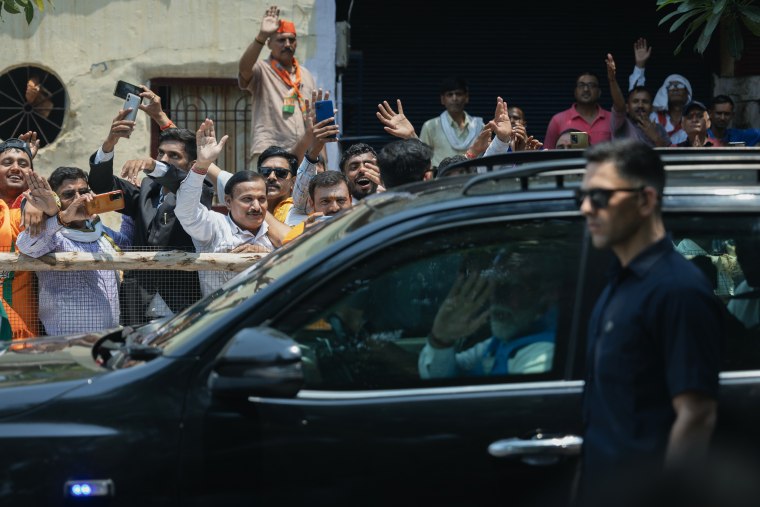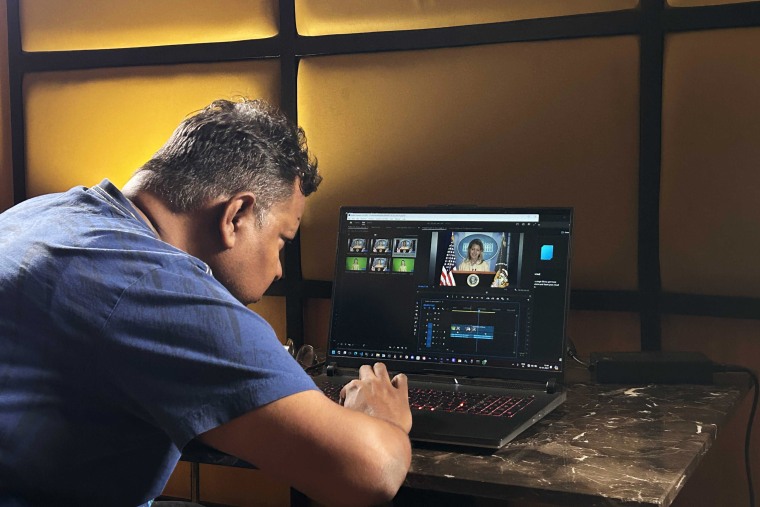CHENNAI, India – A 20-minute voice recording and a few pictures of a person’s face are all Senthil Nayagam needs to make fake scary campaign videos in any language.
Political parties in India spent about $16 billion in the world’s biggest election that culminated on Tuesday, when Prime Minister Narendra Modi claimed victory despite a weakened mandate.
In what has been called India’s first “artificial intelligence election,” significant campaign funds were spent on hiring artists such as Nayagam, chief executive of Chennai-based start-up Muonium AI, to established deep fakes that promote or discredit candidates that spread like wildfire throughout. social media.
These videos use artificial intelligence to generate believable but fake depictions of real people saying or doing almost anything the creators want, from a video of Modi dancing to a Bollywood song, to a politician who died in 2018 doing revived to support his friend’s run for office.

Experts say what has unfolded in India in recent weeks is just a preview of the chaos that could overturn electoral processes in this year of back-to-back global elections, including in the US in November. While deepfakes are not new, advances in AI technologies mean they can now be produced on an unprecedented scale, with higher quality and accessibility.
“What you’re seeing now is the use of AI tools to be able to deal with hundreds of different issues and create many different messages around those parts of the conflict at scale,” said Josh Lawson, director of AI and democracy at Aspen Digital. .
“It just dilutes the information environment,” he said.
Nayagam is primarily known for his AI work for Bollywood and TV commercials. When political parties he declined to identify asked him for help with their campaigns, he was open to it — up to a point.
“Anything that is unethical, we want to avoid that,” he said. “I don’t want to do what’s too controversial.”
This includes, he said, requests to change something said in Parliament and creating fake phone conversations. “We have firmly rejected them,” Nayagam said.
He also tries to deal directly with campaign managers rather than politicians, and even then he chooses to work with only a few. “I’d rather say no than regret it,” he said.
Nayagam’s concerns stem from a wave of arrests over forgeries by politicians such as Home Minister Amit Shah, a top Modi aide. During the election, a video of Shah giving a speech was altered to falsely depict him promoting policy proposals unpopular with India’s minority groups.
While Modi retweeted his dancing deepfake, calling it “truly a pleasure”, he said Shah’s video was part of a “conspiracy to create tension in society”.
In a soundproof room where he records the voices of his clients, Nayagam showed NBC News reporters a deep fake he made of influential politician Muthuvel Karunanidhi, in his yellow scarf and oversized sunglasses, congratulating his friend TR Baalu on the launch of his memoirs in January. Karunanidhi died in 2018.
Baalu, 82, a parliamentary candidate from the Indian state of Tamil Nadu, where Karunanidhi was chief minister, won his race on Tuesday.
Nayagam also recorded the voice of an NBC News reporter for 20 minutes, even asking her to sing to capture different phonemes and tones. A photographer from his team then photographed him in front of a green screen. The audio and pictures were used to create a “model” that would then be used to generate the final “deepfake”.
Within hours, Nayagam’s team produced a video showing the journalist speaking fluent Italian and Hindi, morphing her face into his daughter’s and making it sound like she was speaking from the White House.
“You’ve literally been cloned,” he said. “It’s like we have a seed and we can plant it anywhere and it can grow into any kind of tree or jungle.”
AI tasks that used to take days will become faster, Nayagam said: “We will move to minutes and seconds in the future.”

Lawson said there is a danger that people will lose sight of reality. “So instead of voting based on facts and verifying what I understand, I’m going to vote based on my vibes and intuition,” he said.
Concerned US lawmakers have taken steps to protect the democratic process against AI, with at least 11 states banning election interference through the use of deep rigging.
Lawmakers in California, home to many of the world’s largest artificial intelligence companies, are considering a series of AI-related bills, including one that would ban “materially fraudulent” election-related falsifications in the 120 days before voting.
Lawmakers said they were concerned by AI-generated robocalls New Hampshire Democrats received in January in which a voice impersonating President Joe Biden encouraged them not to vote in the state’s primary. Bipartisan legislation banning the use of AI to falsely describe federal candidates has stalled in both the House and Senate and is unlikely to pass before the November election.
Strict regulations are needed to tackle AI-powered disinformation during elections, said Raman Jit Singh Chima, director of Asia-Pacific policy at Access Now, a US-based nonprofit that focuses on digital civil rights.
The Big Tech platforms where the content is ultimately being distributed also have a responsibility in moderating it, he said.
“You need proactive disclosure and regulatory measures for candidates and political parties,” he said.
While it’s unclear to what extent AI influenced voter perception or influenced the results in India, the US and other countries can learn lessons that could be crucial in protecting the integrity of their elections, Lawson said.
Data collection over the next few months on how technology ultimately affected Indian elections could provide that critical insight.
“We have to do it now,” he said.
#changing #elections #world
Image Source : www.nbcnews.com